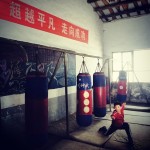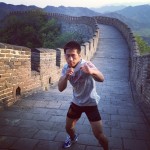gong fu
Posts
-
Kung Fu Kids
-
Glossary of Terms
I recently came across a very fascinating analysis of the difference between 工夫茶 (gōngfū chá) and 功夫茶 (gōngfuchá) on LanguageLog. Both refer to the art of brewing tea in a clay pot and serving the tea in small cups.
The discussion was fascinating to me in general, because I brew my tea in a clay pot “gong fu style,” but also because the characters that are used most often to describe this method of brewing tea are 功夫茶 – and 功夫 is of course Kung Fu, the martial art and way of life I am researching on this blog.
There are a few phrases used for Kung Fu and all of them have a slightly different meaning and usage. The following are some terms I will use on this blog and the way in which I will use them. I encourage anyone to disagree or augment any of the descriptions I have below:
1) Kung Fu: This is the most common usage outside of China for Chinese martial arts. This is the anglicized version of 功夫, which in modern Mainland pinyin, “the official system to transcribe Chinese characters into Latin script in the People’s Republic of China, Republic of China (Taiwan), and Singapore,” is actually written “gōngfu”. In my own personal communications or blogs, I use gong fu. Here on this blog I will use Kung Fu as much as possible, in order to appeal to a more general audience. I may switch to gong fu because it feels right to me.
-
The scholar and the businessman
There are two masters who have inspired me to do this thing and do it right.
The first lives nearby. His home is a drafty farmhouse that sweats in the sun and shivers in the cold grey rain of winter. Most days he sits alone at a table and sips tea. Sun bleached photos of him, his master, and friends and family hang on wooden poles wrapped in rope around the farmhouse. A few kids wander in and out of a room with the TV running. They are unwanted kids from the mountains with little in the way of education or opportunity. Shifu trains them in kungfu, but they are not real students. Just kids in need of a place to be and a father figure to watch over them.
Every now and then he attacks the iron circle, beats up the wooden dummy, dances in and out of reach of swinging bamboo poles. When someone shows up, the energy level rises and he takes off his shirt and starts training. Horse stances, blocks and strikes. Running and stretching. Kicking the bag. When the farmhouse stands empty, he texts his friends and dreams of a school in the mountains, where dozens of dedicated disciples rise before the sun and train till night falls. At night he eats rice and vegetables and slaps mosquitos in his sleep. When I watch him at his table, I think of a warrior-scholar, like many others I have seen in China over the years.



